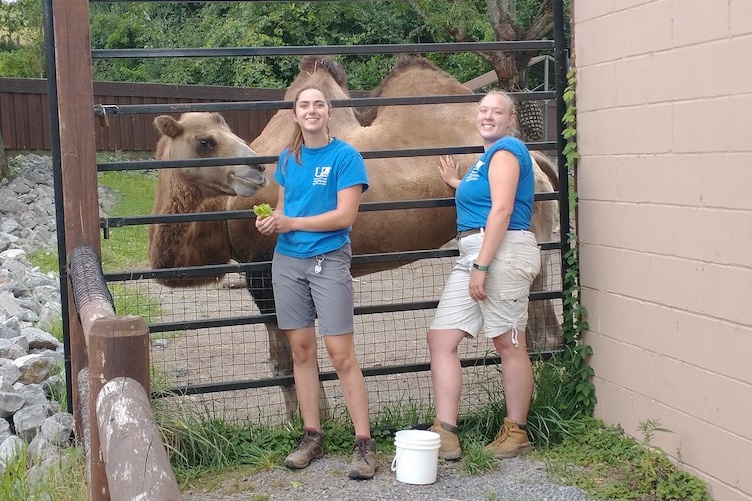
Olivia MacKenzie ’23 and Ashley Carnes ’23 work with Najla the camel at the Utica Zoo in New York, where the COLSA students are completing internships this summer. (Photo courtesy of Elizabeth Slabaugh/Utica Zoo).
For Ashley Carnes ’23, one of the perks of her summer gig that she looks forward to every day is the opportunity to set up an afternoon scavenger hunt.
The participants? A trio of warty pigs.
Amid all the on-the-job education taking place on a daily basis and the steady checklist of routine tasks to complete – like beginning the morning by feeding dozens of different animals before cleaning their enclosures – Carnes takes particular pleasure in leaving some treats for the pigs to discover after she’s gone home for the day.
“One of my personal favorite forms of enrichment for the animals is hiding fruits and veggies around the pig enclosure for them to find later in the evening,” Carnes says. “I love hiding them under logs and under rocks so they have to push stuff around to find them. They love digging around with their noses.”
Carnes and fellow rising UNH senior Olivia MacKenzie ’23 are completing summer internships working with zookeepers at the Utica Zoo in New York – thanks to assistance from the College of Life Science and Agriculture’s SOAR fund – where they’ve been able to experience a blend of educational responsibilities and enriching connection to the animals like those Carnes describes, and the result may end up shaping career choices.
“I know I want to work with animals or in the natural resources field. I love nature, I love animals, and I can’t imagine doing a job that doesn’t involve animals,” Carnes says. “Because of that I’ve been thinking about going into wildlife rehab or possibly even zookeeping, and this internship has definitely opened my eyes to know that maybe this is what I want to do after college.”
Adds MacKenzie: “This experience is a really good gateway. It’s made me pretty confident in my choice of zoology as my major.”
Carnes and MacKenzie have had the opportunity to shadow zookeepers on a daily basis in order to experience all the responsibilities of the job up close. That includes the morning feedings and enclosure cleanings as well as things like assisting in administering medications – including COVID vaccines – and enrichment activities to keep the animals engaged.
"I love nature, I love animals, and I can’t imagine doing a job that doesn’t involve animals. This internship has definitely opened my eyes to know that maybe this is what I want to do after college.”
And there’s certainly no shortage of different animals to interact with. Between the two of them, the UNH duo has worked with warty pigs, camels, emus, urials, zebras – including a pregnant one, Carnes notes – zebu, alpaca, goats, sheep, muntjac deer, wallabies, cranes, red foxes, chickens, beavers, a falcon, a barred owl, a night heron, two bunnies and a Pallas’s cat, who MacKenzie said is affectionately known as grumpy cat because of its naturally surly visage.
Beyond shadowing and learning directly from the zookeepers, the students have had the opportunity to develop and showcase some of their own skills and knowledge, as well, as both have led educational sessions for zoo visitors that focus on specific animals – MacKenzie on zebu and Carnes on emus and urials. They have also assisted zookeepers during educational presentations about other animals, often feeding the animals or otherwise helping create interaction between them and the guests. MacKenzie credited the connections she's built with other interns and zookeeper staff for making the experience more enriching.
Looking ahead, MacKenzie said she is excited to complete an intern project later this summer in which she will target train muntjac deer using a stick with a ball attached to it, with a goal of teaching the deer to stand on their hind legs through positive reinforcement — using the cue, response and reward mechanism.
“Target training is a way to promote a behavior, and it’s a way to show guests that the animals can learn pretty well and exhibit those behaviors.” MacKenzie says. “You hold the stick with the ball attached out in front of them, and when they touch it with their noses, you reward them with a treat. Then they’ll follow it wherever you move it.”
Carnes said her project will likely either focus on creating an enrichment toy for an animal or completing a habitat alteration to make it more engaging for the animals.
Neither Carnes nor MacKenzie has made any final decisions about their career paths yet, but working with animals has always been a consideration – Carnes has worked at Great Bay Animal Hospital in Durham as well as a veterinary practice in her home state of Connecticut, and MacKenzie says she’s considered attending veterinary school among other options for a post-grad degree – and the experience in Utica has only emphasized the draw of working in such an environment.
“You can definitely see the animals’ connections and their comfort level with certain people,” Carnes says. “Being here you fully understand that working with these animals is building a bond, almost like with your dog or cat. You can see the personalities of these animals and understand them, and I feel as a zookeeper you get so close to them. It’s really nice seeing that and understanding the zookeepers’ passion for it.”
-
Written By:
Keith Testa | UNH Marketing | keith.testa@unh.edu

















































